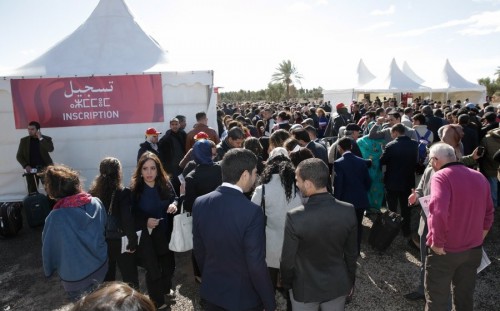3rd December 2014 London, UK
What is civil society?
Last Friday I met members of the FCO’s “Youth Inspiration Group” – nine young people, between 18 and 25, from diverse backgrounds. With a combined network of over 3,000 (via the youth organisations and individual contacts they have) this group lends their time to the FCO, as a sounding board for our ideas. To help us stay connected with the “civil society” we serve.
So it came as a bit of a shock that one of my opening sentences met with glazed expressions. I was describing the theme we had chosen for Human Rights Day on 10 December, “Protecting Civil Society Space”. I may even have said we were “alarmed by the shrinking of civil society space” in many parts of the world. I felt like a floundering producer, pitching a bad science fiction film to a sceptical focus group.
The Group’s reaction tells me that “civil society” is not a term most people are familiar with. Rather, it forms part of the jargon those of us who work on human rights can easily slip into. But it’s important to find the right words, because the situation behind the jargon is real and serious. As Thomas Carothers of the Carnegie Endowment for International Peace put it, in his influential article Closing Space – Democracy and Human Rights Support Under Fire – “governments all round the world are erecting legal and logistical barriers to externally sponsored democracy and human rights programmes they deem too politically intrusive”. There is pushback.
Like many problems of definition and vocabulary, this one disappears in the presence of practical examples. My most vivid exposure to the problem was at the Organisation for Security and Cooperation in Europe’s (OSCE) human rights conference in Warsaw recently, where non-governmental organisations (NGOs) sponsored by the Russian government (“GONGOs”) clogged the speakers’ list and made a mockery of proceedings. To find real Russian civil society – the NGOs still bravely battling to be heard – I had to meet them in the margins. That’s what I mean by “shrinking civil society space”.

This weekend, by contrast, I had a refreshing example of healthy civil society in action, when I attended the “Second World Forum on Human Rights” in Marrakesh. Heavy rain and the fact that it all took place in tents meant that visiting Brits inevitably drew comparisons with Glastonbury Festival. But similarities stopped there. This was the Francophone civil society of North West Africa fervently debating human rights and exercising their freedoms – widening their horizons and their room for manoeuvre. That’s what I mean by “protecting civil society space”.
A colleague of mine (and fan of the Great British Bake-Off) has offered this definition. If civil society were a cake, then the ingredients would be public will, democracy, freedom of speech, voluntary work, charities, neighbourhood schemes, international bodies such as the United Nations or the Red Cross, religious organisations, and NGOs, such as Amnesty International, Human Rights Watch etc.
Why does the FCO care if civil society in other countries is shrinking; if other people’s cakes fail to rise? Well, there are still many countries in the world where governments focus on their own self-interest, rather than governing in the interest of their citizens. This often involves human rights violations: censorship, repression, torture, and even murder, to ensure they can continue to lead lives of privilege. Civil society is an important bulwark against overweening state power. When strong enough, civil society holds governments to account, strengthening institutions apart from government (e.g. the Judiciary), and the balance between them (“the rule of law”).
As the Arab Spring showed, repressed societies can easily become unstable. Most international crises are linked to human rights violations. For the good of all the world’s citizens, we must help build civil society wherever we can. The FCO does this in a number of ways:
- Supporting “human rights defenders” – more jargon, but these are people who act to protect the human rights of others, often risking their own lives and liberty to do so. Our embassies and high commissions help to ensure that such brave people do not mysteriously disappear. We raise our concerns with other governments and observe trials.
- Funding projects in countries with human rights problems that aim to strengthen civil society and support freedom of expression. We explain that this is strongly in the economic interest of the countries concerned. The “knowledge economy” (jargon!) can’t flourish where civil society is stifled.
- Working through the European Union and other international organisations to turn up the volume.
The challenges that civil society across the world is facing as we approach this year’s Human Rights Day are wide-ranging, from new laws regulating NGOs in Azerbaijan, to prison sentences of up to 15 years for “publishing false information” in The Gambia. All such laws have at least one thing in common: they amount to self-harm by the governments concerned, because they squander the country’s most precious resource, the energy and creativity of their people. And they will all, I believe, prove self-defeating in the long run. From this point of view, “protecting civil society space” is a good example of how human rights work boils down to explaining to our international partners where their own self-interest lies. Which we will not stop doing. Because the UK has nothing to gain from their failure, and everything to gain from their success.